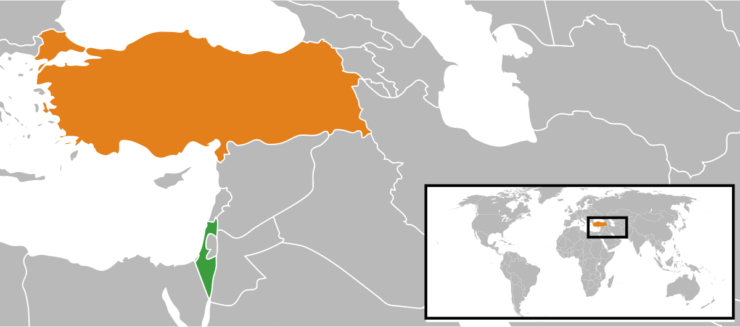
Tel Aviv. Turkey’s efforts to expand its military influence in Azerbaijan may affect the defense relations between Israel and the Azeris, said senior sources in Israel.
The formal relations between Turkey and Israel are normal but some of the actions in recent years “raise many questions in Jerusalem.”
Turkey is a NATO member but in spite of that fact decided to purchase the Russian made S-400 air defence systems. This brought US to cancel the sale of the F-35 stealth fighter to Turkey.
Azerbaijan has developed close defence relations with Israel, and in recent years purchased different Israeli made weapons systems valued at billion of US$.
As part of Erdogan’s expansion program, during the recent clash between Azerbaijan and neighboring Armenia, in last July, Ankara expressed full support for the Azeris. The Turks offered military assistance in accordance with the “lobby model.” Now they seem to be translating the promises into solid help.
Sources close to the Turkish-controlled Syrian militias in the north of the country report that they have recently begun recruiting mercenaries who will go out to strengthen the Azeri army.
At this stage, it is a matter of recruiting about 1,000 Syrian fighters whose monthly salary will reach $1,200. The recruitment is taking place at the Syrian Taftanz airport, and the age of the recruits is between 18 and 30 years.
Meanwhile, it is reported that some 1,200 Syrian fighters have returned from Libya in recent days, after their contract expired. An estimated 18,000 Syrians went to fight in Libya when a third of them had already returned. It was also recently reported that the Turks have decided to cut the proposed salary for mercenaries in Libya to only US$600
It should be noted that in addition to the Syrians, thousands more jihadists came to fight alongside the Turks in Libya, with a significant portion coming from neighboring Tunisia.
Azerbaijan has in recent years purchased some Israeli developed weapons systems including loitering weapon systems to answer specific operational requirements.
This country in late 2018 has acquired the Elbit systems SkyStriker loitering weapon system. This is as part of this country’s plan to acquire autonomous strike capabilities.
The Israeli company refused to comment on the contract. Videos of tests with this system in Azerbaijan recently surfaced on the net.
The SkyStriker is the first such system developed by Elbit Systems. The SkyStriker – a remotely operated electro-optical, precise guided Loitering Munition (LM) is designed to seek, locate and engage various targets for the tactical level military force.
The new platform is based on Elbit Systems’ vast experience providing precise long-range tactical solutions.
According to Elbit, the SkyStriker is capable to locate, acquire and strike operator-marked targets enabling high-precision performance. The system’s electric propulsion provides a low acoustic signature and enables covert low altitude operations.
Due to its flight speed capability, it can reach a distance of tens of miles within minutes. Upon reaching the target area, it can loiter and pursue the target for up to two hours.
Azerbaijan is one of the largest weapons market for Israeli military equipment. This is according to the Stockholm International Peace Research Institute (SIPRI).
In the past this country has purchased another loitering weapon system, the Harop made by Israel Aerospace Industries (IAI). It also purchased the Lora, long range surface to surface precise rocket.
The Harop has been developed to destroy high quality targets. It consists of the munitions unit, transportable launcher and a mission control shelter, which provides real-time access to control the Harop by a man-in-the-loop.
The Harop can be launched from various transportable platforms including sea and ground based canisters or air launched to navigate towards the potential target area. It can be launched at any angle, horizontal or at a vertical trajectory. The sealed container ensures protection from harsh battlefield conditions.
The Harop is armed with a 35 pounds warhead and is equipped with a very advanced day/ night payload (POP-250) made by the Tamam division of IAI.
Harop has an operational range of 620 miles and an endurance of six hours.
HAROP is launched from transportable launchers and navigates towards the target area, where it can loiter and search for targets for up to six hours. Once a target, whether stationary or moving, is detected, it is attacked and destroyed. The attack can be performed from any direction and at any attack angle, from flat to vertical.
-The writer is an Israel-based freelance journalist








